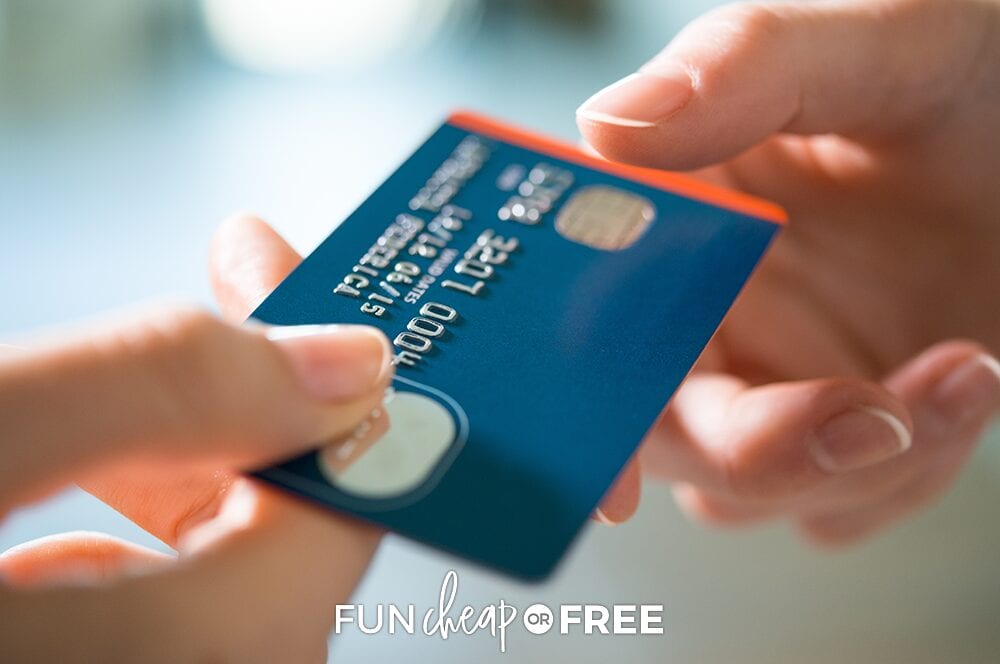Credit cards can be great for building your credit, but really, how do credit cards work? We're here to answer all of your questions and give you some tips, too!

Hey there, Freebs! We're here to talk to you about credit cards. We get so many questions about how credit cards work and when it's smart to use them. Here are just a few:
- How do credit cards work?
- What is a credit card minimum payment?
- What is APR?
- Is it good to have a credit card?
If used properly, and with discipline, credit cards are a GREAT way to work on your credit score! Just make sure you're not spending money that you don't have all willy nilly. Don't let a credit card get you into trouble! So are you ready to learn all about credit cards? Let's do this!
WHY WOULD YOU WANT A CREDIT CARD?

Not only are credit cards great for building your credit score, they're also helpful for several other reasons!
- Protection – They protect you in the case of an emergency. If something crazy happens that you HAVE to be able to pay right then and there, you don't have to worry about having the cash on hand or the money in the bank.
- Safety – Credit cards are also safer than cash. If you lose your cash, then it's gone. If you lose your card, you can cancel it and the credit card company send you a new one. And the credit card company will take care of any credit card fraud if your card is stolen.
- Track Spending – Credit cards also make it really easy to track your spending, especially in today's digital age.
- Perks – And let's not forget about the perks and cash back that you can earn when you use a rewards credit card!
Pretty nice, right?!
WHAT IS A CREDIT CARD?
A credit card is a small, rectangular piece of plastic that allows you to take a line of credit, or a loan, any time you make a purchase. You can get this card and line of credit from many different issuers, like banks or even stores.
How is a credit card different from a debit card, you ask? A debit card is using money that YOU have in the bank. That money is automatically removed from the bank when you make purchases. A credit card is using the issuer's money when you buy something, which you then are billed for to pay back at a later date. Unlike a debit card, a credit card's activity is reported to the credit bureaus. That is why they are a great way to build your credit score when you use them responsibly!
HOW DO CREDIT CARD LIMITS WORK?

Depending on your credit score, your credit card will have a limit of a certain amount of money you're able to borrow at any time during a billing period. Usually, the higher your credit score and income, the higher your credit card limit will be.
Now, just because you have a certain amount of money you can borrow doesn't mean that you SHOULD. It actually is really bad for your credit score if you're borrowing too much! You never want to spend over 30% of your credit limit per month. This is called the “credit utilization ratio.”
If your limit is $10,000, you should never charge more than $3,000 in a billing cycle (even if you're paying it off monthly)! If you find that you're going over the 30% every month, you should call your credit card company to see if you can extend your credit limit. This doesn't mean that you now get to spend MORE money, though! This just allows you to stay within that 30%, so it'll help your credit score rather than hurting it.
CREDIT CARD BALANCE
Your credit card balance is the amount you've charged on your card and haven't paid back yet. Each time you make a payment on your card, you pay down your balance. And each time you use your card to buy something, you add to your balance.
Your available credit balance is the amount of money you can put on your card before you reach your credit limit. If your limit is $10,000 and you've only charged $200, then your available credit balance is $9,800. But remember, you don't want to be spending over 30% of your credit limit!
HOW DO CREDIT CARD MINIMUM PAYMENTS WORK?

We really can't express how important it is for you to pay the full balance on your credit card! However, sometimes life happens and you're just not able to pay the full amount owed. As long as you pay the minimum payment on your bill (or more), you'll still be able to continue using your card.
The minimum payment is usually a fixed rate or a very small percentage of your balance. Regardless, it's usually a very small amount. That can sound very appealing when you don't have the money to make the full payment. But you're charged interest as soon as you aren't able to pay the full amount. That's when you're officially in credit card debt.
Unless you're in a financial disaster and you're only able to pay the minimum amount, never go that route! Especially if you're continuing to make charges to your card.
CREDIT CARD APR AND INTEREST RATE
Not only are you making your credit score awesome when you pay off your statement balance each month, but you're basically borrowing an interest-free, short-term loan from the credit card company! So how do credit card companies make money?
Most credit cards have an APR, or annual percentage rate. This is an interest rate they charge to your account when you're not able to pay the full statement balance. Depending on your credit score and the company, your APR can be anywhere between 13-24.99%. If your APR is 18%, then your daily interest rate would be 0.05% (take your APR and divide it by 365 to get your daily rate).
If you're not able to pay the full statement balance, then you'll be charged that 0.05% EVERY DAY the balance is left on your card until you can pay it off. Those interest fees will rack up quickly, so it's best to pay off your balance as quickly as possible. Make sure you're putting all of the money you have towards your card so that you can get that baby paid off! (If you need more help with this, then be sure to check out our post all about how to pay off credit card debt fast!)
Alright, well hopefully you're no longer wanting to know “how do credit cards work?” Do you have any tips for paying off your credit cards? Share them with us in the comments below!

Is your question now “how do I get out of credit card debt?” Boy, have we got the answer for you! Our super fun video program, Budget Boot Camp, is just what you need. All you need is a screen and you're set to learn from the budget master, herself, woohoo!
If you don't save at LEAST what you paid for the program, we'll refund every dime. You've got nothing to lose! Use the code FCFBLOG to get an extra 10% off because we love ya! 😉
Score some more tips to get the 411 on money and budgeting!
- If you have been wanting to begin budgeting but you're not sure where to start, learn about our simplest budgeting method using an envelope!
- If you're needing to save some money ASAP, do a spending freeze.
- These money-saving phone apps will help you to get cash back while doing your normal shopping!
Check ya later!

Loved this! Please make one about mortgages. I am planning on buying a home in the next few years and I have no clue how mortgages work!
So glad to hear that you liked it! We’re always looking for ideas for posts, so thanks for your input! I’ll have to add it to our list 🙂
This was so helpful!! I don’t know about the US, but here in the UK trying to gain any understanding of credit cards (finances in general) is like learning how to chop water. Thank you so much for posting this, and I agree with the lady above, PLEASE do a mortgages one!
(P.S. I hope that your platform keeps growing, and I believe that kids too would enjoy watching you and benefit so much from what you’re helping us adults to learn! No useful financial advice/teaching (worth mentioning) is offered in schools over here, and it is such a shame, but somehow you make it digestible (and not scary) and that is hard to find!) <3
Enjoyed this! Could you create content on mortgages? Planning to buy a home soon, but I’m clueless about how mortgages function. Any insights would be greatly appreciated as I navigate this process in the coming years. Thanks!